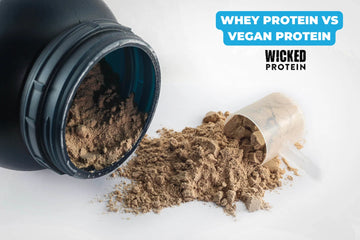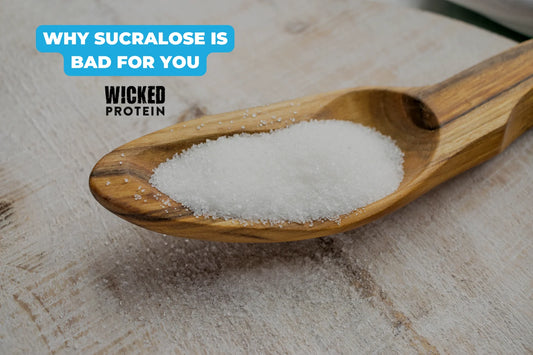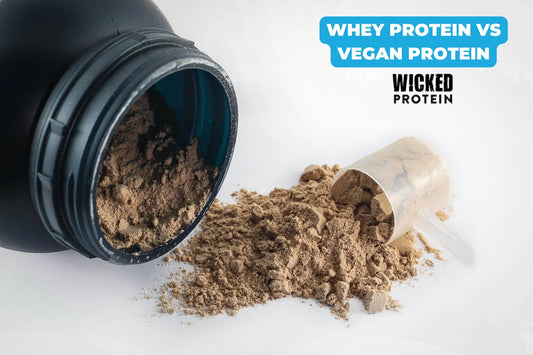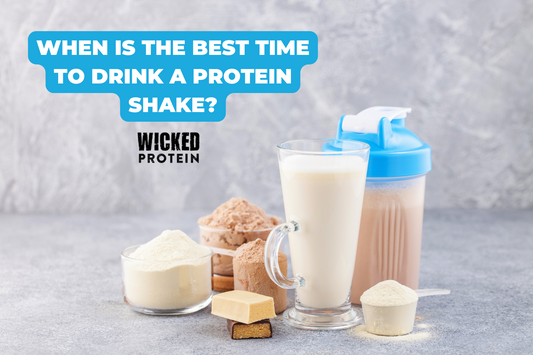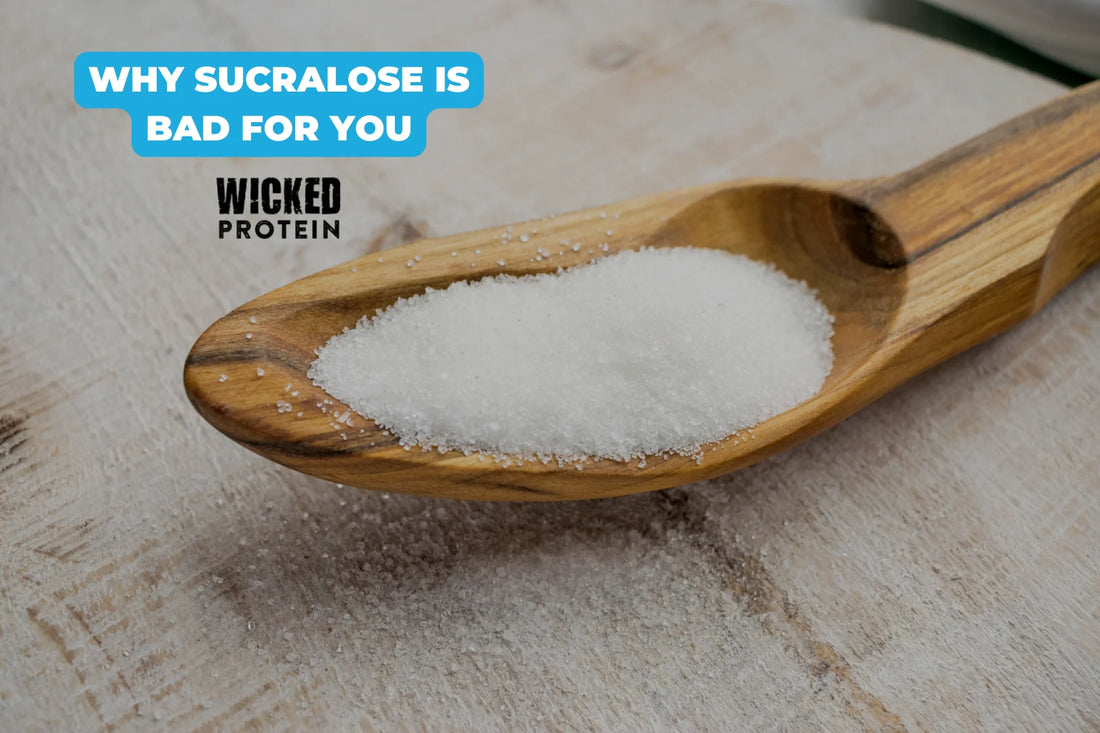
Hidden Dangers of Sucralose: Why You Should Avoid This Artificial Sweetener
Sucralose, a commonly used artificial sweetener can be found in a wide range of processed foods and beverages.
It has raised a ton of controversy around it and many concerns about its potential negative health impact.
Despite being marketed as a safe sugar substitute with zero calories, it has been linked with certain gut issues and inflammation, as well as contributing to conditions like obesity and diabetes.
Cooking or baking sucralose at high temperatures has been reported to produce chloropropanols, a toxic class of compounds.
In this article, we’ll cover the hidden dangers of sucralose and why you should avoid it.
What Is Sucralose?
Sucralose is an artificial sweetener that is commonly used as a sugar substitute in a wide range of food and beverage products.
It is known for its intense sweetness and low-calorie properties, which is why it is a popular choice for people looking to reduce their sugar intake without sacrificing sweetness.
However, what sounds too good to be true, usually is, and sucralose has potential health risks associated with it.
What Is Sucralose Made From?
Sucralose is made from sugar through a multi-step chemical process. This process results in a compound that is approximately 600 times sweeter than sugar and has little to no calories attached to it.
Unlike natural sugars, sucralose is not broken down by the body for energy, which is why it has minimal impact on blood sugar levels.
Is Sucralose Better Than Sugar?
Depends on what you consider ‘better’.
Sucralose is often promoted as a sweeter alternative to sugar with zero calories. However, the potential health risks of consuming sucralose outweigh the fact that it has no calories.
Is Sucralose Safe To Consume?
This is the controversial part of the topic which has been debated among researchers and health experts.
Regulatory agencies like the FDA have approved sucralose for consumption, it has been linked to long-term health issues.
Some studies show that sucralose may alter glucose, insulin, and gut hormone levels, which can have impact on overall health.
If you’re choosing whether or not to consume a product with sucralose, it’s probably best to avoid it and settle for a clean version.
At WICKED, we don’t use any artificial ingredients in our products, only clean and natural stuff.
Why Sucralose Is Bad For You
Sucralose, often marketed under the brand name Splenda, may seem like a convenient sugar substitute, but there are several reasons why sucralose may not be the healthiest choice for you.
Impact on Gut Health
One concerning aspect of sucralose is its impact on gut health.
Some studies have shown that sucralose can disrupt the balance of gut microbiota, the ‘good’ bacteria in our digestive system.
This can weaken the overall health of our gut and lead to digestive issues.
Metabolic Effects
Regular consumption of sucralose may have negative effects on metabolism, which can lead to weight gain and increase the risk of metabolic disorders such as diabetes.
Because sucralose is artificially crafted, it can confuse our body’s natural metabolic processes and impact overall health.
Long-Term Health Risks
While sucralose is considered safe in small quantities by regulatory bodies like the FDA, some studies say that it can damage your DNA and increase the risk of cancer.
This artificial sweetener was also linked to a higher risk of cardiovascular disease, stroke, and coronary heart disease.
Can People With Diabetes Consume Sucralose?
It is recommended for all to avoid sucralose consumption. However, consuming sucralose has minimal impact on blood sugar levels in individuals with diabetes.
In a small study that involved several individuals with severe obesity, sucralose was found to increase blood sugar levels by 14% and insulin levels by 20%, which means sucralose doesn’t have a completely neutral impact on blood sugar levels.
Can Pregnant Women Consume Sucralose?
When it comes to artificial sweeteners like sucralose, consumption within recommended limits will likely not have any impact on pregnant women or their babies.
Apart from the general health risks that are linked to sucralose, there are no studies to suggest that it is unsafe for maternal consumption.
Does Sucralose Affect Weight?
Multiple studies were conducted testing the impact of sucralose on weight gain or weight loss and no pattern was recognized.
Some studies that involved groups that consumed beverages with sucralose saw little change in their weight, while others found no connection between consumption of sucralose and body weight or fat mass.
Natural Alternatives to Sucralose
Natural sugars are a much more studied ingredient than sucralose and can be a healthier choice. Some natural alternatives to sucralose are:
Stevia and Monk Fruit
Stevia and Monk Fruit are both natural sweeteners and great alternatives to sucralose.
Stevia is extracted from the leaves of the Stevia rebaudiana plant and is known for being a zero-calorie sweetener. It is much sweeter than sucralose, so a little goes a long way.
However, some find that stevia has a slightly bitter aftertaste.
Monk Fruit is another natural sweetener that is also zero-calorie and is derived from the Monk Fruit plant and has a sweet taste without any attached calories.
It does not impact blood sugar levels and is safe to consume even for people with diabetes.
The only downside is that it can be more expensive compared to sucralose.
Conclusion
Sucralose, also known as Splenda, is a controversial topic in the health and food industry. It offers a sweet taste with no calories but has also been recently linked with potentially harmful impacts on health and overall wellness.


